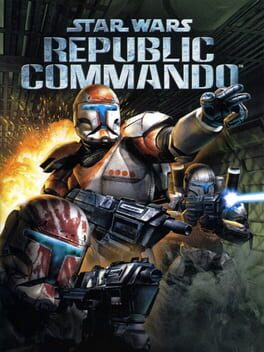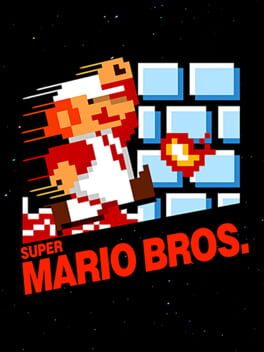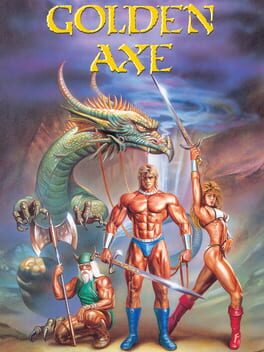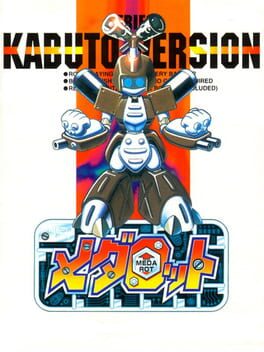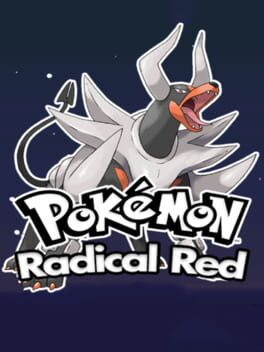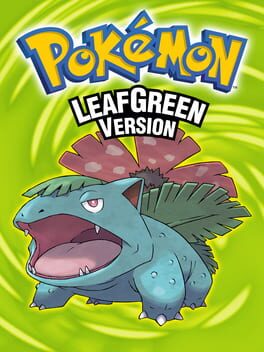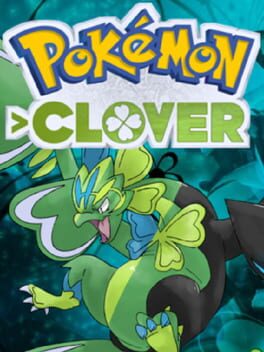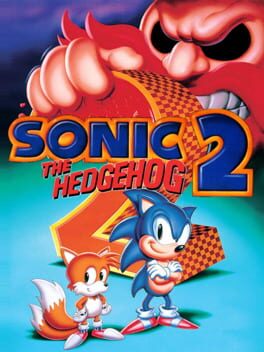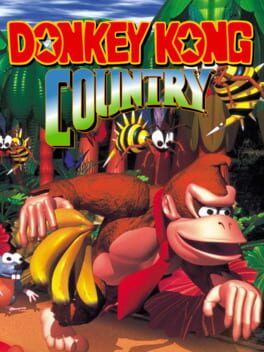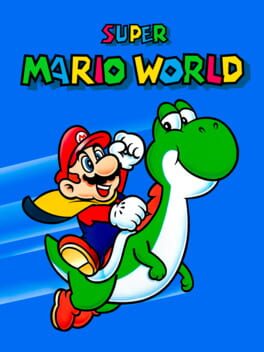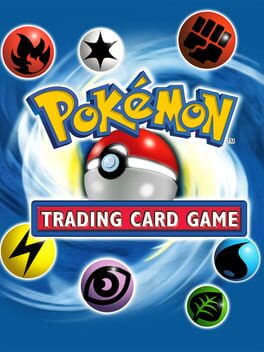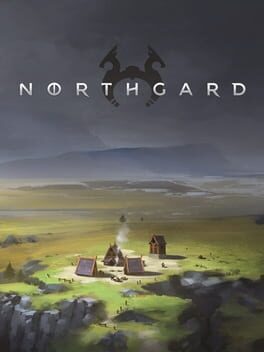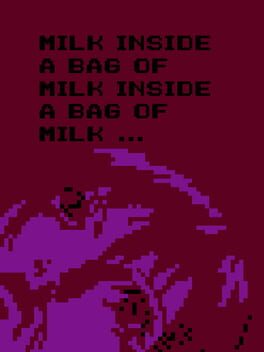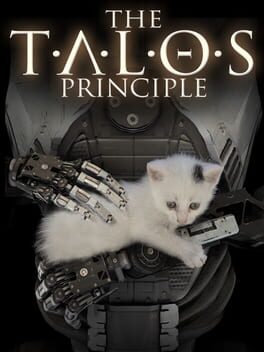Conger_Conger
First of all, this game is a crappy Xbox port from that time in history when Microsoft encouraged developers to make games for the console primarily and PC as an afterthought. As a result, you need a mod called "Republic Commando Fix" if you want improvements such as modern resolutions, larger FOV, improved mouse aim, etc.
As for the review; this is a squad based shooter, and a pretty good one at that. The AI of your companions is solid, it's easy to give them commands and they all have distinctive personalities and specializations, although they can perform different roles in a pinch too.
The shooting itself is a mixed bag because your standard weapons feel weak. They have the standard Star Wars sound effects which is nice, but also very little recoil and most enemies barely react to getting shot. However, you can also find extra weapons that are usually pretty fun and can carry 4 different types of grenade. So, as I said, a mixed bag.
Now, I'm not the biggest Star Wars fan, particularly because I don't like the jedi, so I can't say how authentic the setting is presented. However, I did like the atmosphere of the game, especially the second mission. I will say that the story sections could have benefited from some more runtime though, it feels like there are missing transitions or something.
To conclude, I think Star Wars: Republic Commando is pretty good. It's easy to pick up for a squad based shooter, contains plenty of cool attention to detail and there's a fix for the crappy port. It's also about the cooler aspects of Star Wars in my opinion like commandos, alien warriors and battle droids. Who cares about virgin space wizards?
As for the review; this is a squad based shooter, and a pretty good one at that. The AI of your companions is solid, it's easy to give them commands and they all have distinctive personalities and specializations, although they can perform different roles in a pinch too.
The shooting itself is a mixed bag because your standard weapons feel weak. They have the standard Star Wars sound effects which is nice, but also very little recoil and most enemies barely react to getting shot. However, you can also find extra weapons that are usually pretty fun and can carry 4 different types of grenade. So, as I said, a mixed bag.
Now, I'm not the biggest Star Wars fan, particularly because I don't like the jedi, so I can't say how authentic the setting is presented. However, I did like the atmosphere of the game, especially the second mission. I will say that the story sections could have benefited from some more runtime though, it feels like there are missing transitions or something.
To conclude, I think Star Wars: Republic Commando is pretty good. It's easy to pick up for a squad based shooter, contains plenty of cool attention to detail and there's a fix for the crappy port. It's also about the cooler aspects of Star Wars in my opinion like commandos, alien warriors and battle droids. Who cares about virgin space wizards?
1985
1989
A good old beat 'em up. It's quite simple by modern standards, but not less punishing. The key for this game is crowd control, particularly through the use of the running attack that knocks enemies down.
There's a selection of three characters, as shown in the cover. They have some important differences between them like their range, speed, damage and how much they can charge up their magic. My personal favorite is Gilius Thunderhead, the dwarf.
Golden Axe is also a rare example where the console port of an arcade game comes with extra content despite the worse presentation. That's kinda neat.
Overall, I would recommend giving Golden Axe a try if you have 30 minutes to spare. It's a nice slice of video game history on top of being a reasonably fun experience.
There's a selection of three characters, as shown in the cover. They have some important differences between them like their range, speed, damage and how much they can charge up their magic. My personal favorite is Gilius Thunderhead, the dwarf.
Golden Axe is also a rare example where the console port of an arcade game comes with extra content despite the worse presentation. That's kinda neat.
Overall, I would recommend giving Golden Axe a try if you have 30 minutes to spare. It's a nice slice of video game history on top of being a reasonably fun experience.
1994
A JRPG that stands out in every single aspect except the gameplay. For starters, the setting is highly unique, like a sort of westernized goofy contemporaneous science fiction with fantasy elements. This game really stands out, it's not surprising it has a following.
The writing is often comedic and breaks the fourth wall, everything has a surreal tone that's only reinforced by the presentation. Like battles take place in front of abstract backgrounds, the music has uneven BPM at times and the plot is simply insane.
The main issue with this game is that it's just sort of unremarkable in the moment to moment gameplay. The main story has these fantastical sequences where it's impossible to predict what will happen next, but the combat remains pretty much the same from beginning to end. The most that can happen is getting a new party member and you only get 4 of those.
However, the gameplay is not bad, just a bit bland, but this game lasts close to 30 hours for a regular playthrough so it can get stale, especially when you don't have all the party members available. Thankfully you never need to grind unless you want to farm certain items which is completely optional.
Overall, I think Earthbound is a fantastic game. It's an easy recommendation to anyone who can stomach old JRPGs.
The writing is often comedic and breaks the fourth wall, everything has a surreal tone that's only reinforced by the presentation. Like battles take place in front of abstract backgrounds, the music has uneven BPM at times and the plot is simply insane.
The main issue with this game is that it's just sort of unremarkable in the moment to moment gameplay. The main story has these fantastical sequences where it's impossible to predict what will happen next, but the combat remains pretty much the same from beginning to end. The most that can happen is getting a new party member and you only get 4 of those.
However, the gameplay is not bad, just a bit bland, but this game lasts close to 30 hours for a regular playthrough so it can get stale, especially when you don't have all the party members available. Thankfully you never need to grind unless you want to farm certain items which is completely optional.
Overall, I think Earthbound is a fantastic game. It's an easy recommendation to anyone who can stomach old JRPGs.
The first entry in the Medarot series, now translated thanks to the work of fans, one of the many creature collection RPGs that tried to challenge Pokémon back in the day. For that reason I'll bring up the latter at times for the sake of comparison.
First of all, there's the gameplay. The player can bring up to 3 medarot to battles which are fought in a system similar to ATB, only that the legs currently equipped interact with the terrain to alter certain attributes including speed.
On that note, every piece of the medarot can be swapped for a different one and they are divided into 4 parts in total, the only restriction being the gender of the tinpet (frame) of which you can obtain a total of 9. Individual skills have a base value depending on the medal and increase with use overtime as well so there's a very high degree of customization.
This title also innovated upon the monster catching formula by having multiple endings, although the most important change is what girl you end up with. You can end up all alone too so you better do some side quests. That's kind of mundane if you consider all the crazy stuff that happens during the actual plot.
The final positive aspect I want to mention is the music, the main battle theme in particular is extremely catchy and seared into my brain.
However, that brings me to the first issue I had with Medarot, meaning the frequency rate of random encounters. It's way too high in some sections, a common problem for RPGs at the time. The upside is that all your medarot fully heal after battle, but it still gets tedious to fight the same NPCs over and over.
Second, the structure to the story usually consists on an NPC simply telling you where to go next and there are several missables sprinkled through the game, including some really useful items.
And finally, there's no starter selection, you always get the medarot in the box cover. Each version also has some exclusive parts and there's also a third game that's like a parts expansion, but come on. Picking your starter is an iconic aspect of the genre. It generates free word-of-mouth marketing too, but I digress.
In summary, Medarot innovated in some interesting ways upon the monster catching formula first introduced by Pokémon. However, it still suffers from shortcomings that plagued other RPGs at the time of its release. I think it's a good game, but I would recommend the remake of the second game on the Gameboy Advance to start out instead.
First of all, there's the gameplay. The player can bring up to 3 medarot to battles which are fought in a system similar to ATB, only that the legs currently equipped interact with the terrain to alter certain attributes including speed.
On that note, every piece of the medarot can be swapped for a different one and they are divided into 4 parts in total, the only restriction being the gender of the tinpet (frame) of which you can obtain a total of 9. Individual skills have a base value depending on the medal and increase with use overtime as well so there's a very high degree of customization.
This title also innovated upon the monster catching formula by having multiple endings, although the most important change is what girl you end up with. You can end up all alone too so you better do some side quests. That's kind of mundane if you consider all the crazy stuff that happens during the actual plot.
The final positive aspect I want to mention is the music, the main battle theme in particular is extremely catchy and seared into my brain.
However, that brings me to the first issue I had with Medarot, meaning the frequency rate of random encounters. It's way too high in some sections, a common problem for RPGs at the time. The upside is that all your medarot fully heal after battle, but it still gets tedious to fight the same NPCs over and over.
Second, the structure to the story usually consists on an NPC simply telling you where to go next and there are several missables sprinkled through the game, including some really useful items.
And finally, there's no starter selection, you always get the medarot in the box cover. Each version also has some exclusive parts and there's also a third game that's like a parts expansion, but come on. Picking your starter is an iconic aspect of the genre. It generates free word-of-mouth marketing too, but I digress.
In summary, Medarot innovated in some interesting ways upon the monster catching formula first introduced by Pokémon. However, it still suffers from shortcomings that plagued other RPGs at the time of its release. I think it's a good game, but I would recommend the remake of the second game on the Gameboy Advance to start out instead.
2020
A ROM Hack that introduces a lot of mechanics from later generations, quality of life changes and increased difficulty in the form of level caps, improved AI and trainer teams. Also, like 500 extra Pokemon too.
I played in the minimum grind mode because I didn't want to endanger the ratatta population for speed EVs. For someone with no competitive experience and whose last generation was 3 this was a refreshing experience. I don't think it's that hard either, it's certainly much harder than regular Pokemon, but as an RPG in general it's not that bad. I still managed to beat the game with the creatures I liked the most.
The developers also made changes to several Pokemon and moves in order to make them more competitive which is pretty neat for people who wish their favorite Pokemon was a little bit better. They also added extra bosses on top of the regular gym leaders who award some neat rewards.
Overall, I really liked this ROM Hack. I got to see a bit of what I was missing from not playing more generations after the third one and I got my fill of Pokemon for the next decade.
I played in the minimum grind mode because I didn't want to endanger the ratatta population for speed EVs. For someone with no competitive experience and whose last generation was 3 this was a refreshing experience. I don't think it's that hard either, it's certainly much harder than regular Pokemon, but as an RPG in general it's not that bad. I still managed to beat the game with the creatures I liked the most.
The developers also made changes to several Pokemon and moves in order to make them more competitive which is pretty neat for people who wish their favorite Pokemon was a little bit better. They also added extra bosses on top of the regular gym leaders who award some neat rewards.
Overall, I really liked this ROM Hack. I got to see a bit of what I was missing from not playing more generations after the third one and I got my fill of Pokemon for the next decade.
Usually picking a different Pokemon version means a different legendary, but not this time. The only differences with the FireRed are a handful of version exclusives and the title screen. This goes without saying, but anything I say here applies to both versions.
It almost feels redundant to review a Pokemon game because of how popular the franchise is, but I must have beaten this game a dozen times by now so I want to leave at least a couple of my thoughts.
I don't think I ever saw a GameBoy Advance for sale in my country so emulation was the only way I had to experience Pokemon. The lack of English speaking skills also meant I got stuck often, but I would emulate this in every device that could run it so eventually I managed to beat the game.
Forming your own party is an aspect I've always enjoyed in RPGs and this game has that in spades. I had fun just playing through the game again or doing self imposed challenges... until the day I saw another kid beat the game with a single overleveled starter. That was the unmistakable sign that I was too old for Pokemon, the magic dies once you realize the difficulty is designed for babies.
Anyways, I like this game, but I'm not sure how good it is compared to later generations because I haven't played them. I've played some ROM Hacks which I think are good and keep things interesting too. This is by far the most modded generation so there's probably something for everyone.
It almost feels redundant to review a Pokemon game because of how popular the franchise is, but I must have beaten this game a dozen times by now so I want to leave at least a couple of my thoughts.
I don't think I ever saw a GameBoy Advance for sale in my country so emulation was the only way I had to experience Pokemon. The lack of English speaking skills also meant I got stuck often, but I would emulate this in every device that could run it so eventually I managed to beat the game.
Forming your own party is an aspect I've always enjoyed in RPGs and this game has that in spades. I had fun just playing through the game again or doing self imposed challenges... until the day I saw another kid beat the game with a single overleveled starter. That was the unmistakable sign that I was too old for Pokemon, the magic dies once you realize the difficulty is designed for babies.
Anyways, I like this game, but I'm not sure how good it is compared to later generations because I haven't played them. I've played some ROM Hacks which I think are good and keep things interesting too. This is by far the most modded generation so there's probably something for everyone.
2020
A highly offensive Pokemon ROM Hack filled with references to 4chan memes, most of them outdated by now. There's even a special pokeball that works better for offensive designs.
Of particular note is that all the original 386 creatures have been swapped by new ones with completely different design, typing, moves, etc. Pretty much all of them are comedic in nature, but they actually took the time to make them competitive and fill a specific niche. The attention to detail that went into creating nearly 400 of them can't be understated.
This game also implements a ridiculous amount of quality of life features and design elements from increased difficulty mods. You would think something like this would be merely a vehicle for offensive jokes and references, but it's not, it's actually good. Great, even.
I also have to mention the music because there are plenty of original tracks too and they are all winners in my opinion, my personal favorite is the Team Karma theme. On a similar note, many of the original characters have been replaced by new trainers with their own story and motivation. The post game in particular is very extensive and fleshes out the world a lot.
To conclude, I personally found this game hilarious for the most part and very fun overall. It's also doomed to niche status by its highly offensive nature, I'm surprised it's even listed in this site. However, I have a high tolerance for intolerance so I don't mind it, I think Pokemon Clover is great.
Of particular note is that all the original 386 creatures have been swapped by new ones with completely different design, typing, moves, etc. Pretty much all of them are comedic in nature, but they actually took the time to make them competitive and fill a specific niche. The attention to detail that went into creating nearly 400 of them can't be understated.
This game also implements a ridiculous amount of quality of life features and design elements from increased difficulty mods. You would think something like this would be merely a vehicle for offensive jokes and references, but it's not, it's actually good. Great, even.
I also have to mention the music because there are plenty of original tracks too and they are all winners in my opinion, my personal favorite is the Team Karma theme. On a similar note, many of the original characters have been replaced by new trainers with their own story and motivation. The post game in particular is very extensive and fleshes out the world a lot.
To conclude, I personally found this game hilarious for the most part and very fun overall. It's also doomed to niche status by its highly offensive nature, I'm surprised it's even listed in this site. However, I have a high tolerance for intolerance so I don't mind it, I think Pokemon Clover is great.
1992
Arguably the essential 2D Sonic game. It either introduced or consolidated many of the characters and mechanics that ended up being emblematic for the series, for better or worse. Although honestly the only aspect I don't like are the chaos emerald minigames.
Each stage has its own mechanic that makes it memorable and the game stays fresh for the most part if you run out of lives and have to start all over again because they have different routes you can take.
You can also go very fast if you are good which wasn't possible for every stage in Sonic 1. That's neat because going fast is inherently satisfying for my monkey brain, but I'm also not mentally ill enough to try speedrunning.
Also, as always, the music is fantastic. This remains the only thing you can be certain is true for Sonic games.
Each stage has its own mechanic that makes it memorable and the game stays fresh for the most part if you run out of lives and have to start all over again because they have different routes you can take.
You can also go very fast if you are good which wasn't possible for every stage in Sonic 1. That's neat because going fast is inherently satisfying for my monkey brain, but I'm also not mentally ill enough to try speedrunning.
Also, as always, the music is fantastic. This remains the only thing you can be certain is true for Sonic games.
1994
A platformer with a lot of character, cool mechanics and music that's way too good for game about jumping monkeys.
There's a general structure to each stage which consists on introducing a gimmick and then progressively increasing the difficulty. In this regard, every level is unique because it has a different theme and they really milk them for all their worth.
There's a general structure to each stage which consists on introducing a gimmick and then progressively increasing the difficulty. In this regard, every level is unique because it has a different theme and they really milk them for all their worth.
1990
An adaptation of the classic Pokémon game structure with TGC rules instead of regular turn based combat.
The game is very impressive for the time containing all the cards from the first 3 sets of the real card game numbering over 200 cards in total plus a few that are exclusive to this title.
I think this is a fun way to experience the game, especially because it's fun to bully the NPCs with meta decks. Also, the music is pretty good.
The game is very impressive for the time containing all the cards from the first 3 sets of the real card game numbering over 200 cards in total plus a few that are exclusive to this title.
I think this is a fun way to experience the game, especially because it's fun to bully the NPCs with meta decks. Also, the music is pretty good.
2018
Quite original for an RTS game. It reminds me a bit of something Stronghold because of the way population and combat works. However, base building is completely different since there are no supply lines and such.
People call this a 4X game too which is kind of true. Obviously it can't afflict you with a case of "one more turn" when it's played in real time, but the upside is that you can complete a game within a single hour, and that's a decent trade-off.
I would say the way that the Viking theme is characterized is one of its weakest aspects, but the main campaign is fun nonetheless. I found the writing to be a bit dull, but it's elevated by some good voice acting.
As for presentation, I don't particularly like the aesthetics of the game because they look a tad generic. I could say the same about the music and sound effects, which is kind of bad for an RTS which tend to have very memorable voice lines and such. For as good as the voice acting is in the campaign, units during skirmishes communicate exclusively through grunts.
Apart from multiplayer there are skirmishes against the AI and conquest mode which is generally harder and adds some random elements to keep things fresh. I think that's great for singleplayer content.
Overall, I'm left with positive feelings about Northgard. To me, it's not the most memorable game, but it's fairly original and quite fun nonetheless.
People call this a 4X game too which is kind of true. Obviously it can't afflict you with a case of "one more turn" when it's played in real time, but the upside is that you can complete a game within a single hour, and that's a decent trade-off.
I would say the way that the Viking theme is characterized is one of its weakest aspects, but the main campaign is fun nonetheless. I found the writing to be a bit dull, but it's elevated by some good voice acting.
As for presentation, I don't particularly like the aesthetics of the game because they look a tad generic. I could say the same about the music and sound effects, which is kind of bad for an RTS which tend to have very memorable voice lines and such. For as good as the voice acting is in the campaign, units during skirmishes communicate exclusively through grunts.
Apart from multiplayer there are skirmishes against the AI and conquest mode which is generally harder and adds some random elements to keep things fresh. I think that's great for singleplayer content.
Overall, I'm left with positive feelings about Northgard. To me, it's not the most memorable game, but it's fairly original and quite fun nonetheless.
2014
A solid puzzle game, it's hard to not get reminded of Portal 2 while playing it due to some shared mechanics such as pressure plates, cubes and lasers, but also some writing and aesthetic choices. That being said, The Talos Principle leans way more on the philosophical matters surrounding AI and its implications for humanity.
I think the puzzles are generally good and the developers stretched the available tools to an impressive degree. Some of the puzzles near the end of the game require precise use of the available tools in order to succeed. There's only one tool I didn't really like because it requires standing around doing nothing.
On a different note, I believe the writing is highly competent, but the interactive elements are rather limited. Many of the questions the game presents to the player during interactive segments have a multiple choice format which is good for machines, but not so much for humans. There's a reason why teachers often also ask students to justify their answer in written tests.
As a result, I often felt like the consequences to my choices, so to speak, didn't really matter to me on a personal level because the answer I gave didn't really represent me to begin with. Although I can see the trick working on other people and it's an interesting read regardless.
Overall, I would say The Talos Principle is pretty good. It's an easy recommendation to anyone who enjoys puzzle games and it's a lot more cerebral than other titles in the genre, or video games in general.
I think the puzzles are generally good and the developers stretched the available tools to an impressive degree. Some of the puzzles near the end of the game require precise use of the available tools in order to succeed. There's only one tool I didn't really like because it requires standing around doing nothing.
On a different note, I believe the writing is highly competent, but the interactive elements are rather limited. Many of the questions the game presents to the player during interactive segments have a multiple choice format which is good for machines, but not so much for humans. There's a reason why teachers often also ask students to justify their answer in written tests.
As a result, I often felt like the consequences to my choices, so to speak, didn't really matter to me on a personal level because the answer I gave didn't really represent me to begin with. Although I can see the trick working on other people and it's an interesting read regardless.
Overall, I would say The Talos Principle is pretty good. It's an easy recommendation to anyone who enjoys puzzle games and it's a lot more cerebral than other titles in the genre, or video games in general.
